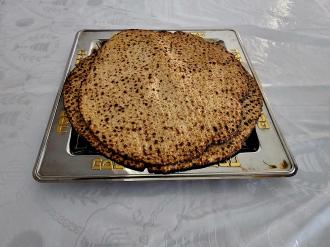When instructing the Kohanim regarding the details of bringing an עולה — elevation-offering, G-d departs from using the verb most often used when communicating to Moshe to 'say' or 'speak' to them, and instead tells him צו — to 'command' them.
Rashi adds that this more emphatic term is intended to urge extra zeal in dispatching this duty and should be conveyed constantly to future generations.
This verb is used in the very first command in the Torah — after the creation of Adam — where it describes how, ויצו — And G-d commanded, the man… The Zohar says that embedded in the verse are the original seven commands incumbent on mankind, with this very first צו — 'command' referring to idolatry. In the words of the Zohar, לית צו אלא עבודה זרה — the word 'command' alludes only to idolatry.
It would seem there is a difference of opinion whether צו implies simply 'zeal' or an accentuated avoidance of the sin of idolatry.
Further adding to the intrigue is a teaching of the great and loyal disciple of the Arizal, Rav Chaim Vital, who reveals that the word צו is numerically equivalent to המן — the evil Haman, when adding 'one' for the כולל — its 'whole'.
What are we to make of all this?
When Haman plotted to annihilate the Jewish people the Megillah records that he sought to accomplish that remarkably difficult undertaking ביום אחד — in one day!aman=Ha
In another display of the ונהפוך הוא — 'and it was turned about' principle, the Jews gathered on Haman's intended day of genocide and did away with 75,000 of their enemies in 'one day', gaining relief and celebrating the following day.
There clearly seems to be an intended contrast between the hateful zeal of Haman and his 'divine' mission to destroy the Jewish people, and the loyal eagerness of the Jews to fulfill their 'command' to quash their enemies.
The Olah sacrifice requires an extra measure of zealousness in getting it done. Rashi quotes in the name of Rebbi Shimon who taught that the Scripture especially needs to urge people to meticulously fulfill commandments במקום שיש חסרון כיס — 'monetary loss' in involved.
There is much discussion about what loss they are referring to. Perhaps it reflects the fact the Kohen does not consume any part of the offering, as an Olah is totally burnt upon the Altar and the Kohen is only entitled to its hide.
The first Rebbe of Gur, Rav Yitzchak Meir Alter, popularly known as the Chidushei HaRim, offers a novel understanding of what type of חסרון כיס Rebbi Shimon is referring to.
An Olah we are taught atones for several types of sin, and more specifically for הרהורי הלב — improper thoughts of the heart. (תרגום יהונתן)
The Rebbe observes that our bodies' physical portals that are exposed to sin; our mouth; our eyes; our ears; each have a barrier to prevent infiltration. We can close our mouths by shutting tight our lips and prevent speaking inappropriately. We can shut our eyelids in avoiding sightly temptations. We can take the lobe of our ears and plug up our ears from hearing seductive words. Only the mind is vulnerable to open thoughts with nothing to obstruct them from influencing us.
This is what Rebbi Shimon is addressing. All the avenues for sin have a כיס — covering, a blocker. The most dangerous entry into our soul though, our mind and its wandering thoughts, have nothing to assist us in fending them off.
The only way one can overcome invading thoughts is by remaining focused on relationship with G-d, reiterating our love for Him by carrying our His will with alacrity, that leaves no room for lapses of consciousness that leave us vulnerable to creeping thoughts of doubt.
We must take a lesson from Haman's playbook. His hatred was so powerful it blinded him to the consequences of his actions.
Why did he need to wipe them out in one day?
The great ethicist, and disciple of the school of mussar of Nevardok, Rav Chaim Zaitchik, suggests that Haman knew that the Jews were experiencing a period of concealment from their G-d and thus vulnerable to the 'measure of judgment' befalling them. But he knew it may not last. He foolishly miscalculated thinking he could win the ultimate game of chess with G-d, and do them in. What was he thinking? Obviously when driven by blind hate one is incapable of clear thinking.
In the 'turnabout', the Jews regained a deepened appreciation of their Father who would never abandon them and came to the realization that their former rationalizations that led them to compromise their ideals is what nearly doomed them. With renewed zeal they ran blindly to the embrace of their loving Father, never leaving any lapses of consciousness that might allow poisonous thoughts to enter their minds.
The sinful impulses we sometimes submit to are mindless instincts we have yet to conquer. They do not, in and of themselves, represent an abandonment of G-d.
Our הרהורי עבירה — improper thoughts of the heart, though, are doubts that truly question G-d's providence and dominion. It is tantamount to worshipping other 'foreign forces' that defy His will. It is these dangerous invaders we can only defeat by submitting ourselves to His will with a blind and zealous love that leaves us no room for doubt.
We can never be checkmated. But we can certainly ride the rollercoaster of emotions when we veer off course, forgetting our Father in Heaven's ceaseless devotion to us.
We must embrace G-d with our eyes closed, knowing that in the game of life with our zealous devotion we can never lose!
באהבה,
צבי יהודה טייכמאן

















